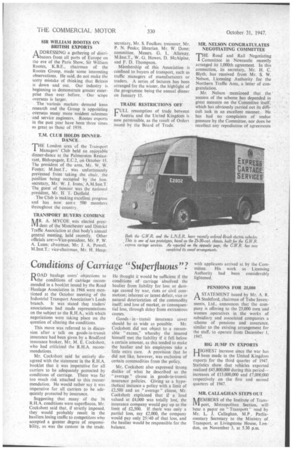Conditions of Carriage "Superfluous"?
Page 26

If you've noticed an error in this article please click here to report it so we can fix it.
ROAD haulage users' objections to ‘the conditions of carriage recommended in a booklet issued by the Road Haulage Association in 1946 were mentioned at the October meeting of the Industrial Transport Association's Leeds
branch. It was stated that traders' associations had made representations on the subject to the R.H.A., with which negotiations were taking place on the question of altering the conditions.
This move was referred to in discussion after atalk on goods-in-transit insurance had been given by a Bradford insurance broker, Mr. M. E. Cockshott, who had criticized the R.H.A. recommendations.
Mr. Cockshott said he entirely disagreed with the statement in the R.H.A. booklet that it was imperative for all carriers to be adequately protected by conditions of carriage. There was far too much risk attached to this recom mendation. He would rather say it was imperative for all carriers to be adequately protected by insurance.
Suggesting that many Of the 36 R.H.A. conditions were superfluous, Mr. Cockshott said that, if strictly imposed. they would probably result in the hauliers losing traffic to competitors who accepted a greater degree of responsibility, as was the custom in the trade. He thought it would be sufficient if the conditions of carriage absolved the haulier from liability for loss or damage caused by war, riots or civil commotion; inherent or latent defect, vice or natural deterioration of the commodity itself; and loss of market, or consequential loss, through delay from extraneous causes.
Goods in transit insurance cover
should be as wide as possible. Mr. Cockshott did not object to a reasonable "excess," whereby the insured himself met the liability -if it fell below a certain amount, as this tended to make the haulier and his employees take a little extra care. A provision that he did not like, however, was exclusion of certain commodities from the policy.
Mr. Cockshott also expressed Wong dislike of what he described as the " average " clause in goods-in-transit insurance policies. Giving as a hypothetical instance a policy with a limit of £2,500 and an •" average" clause, Mr. Cockshott explained that if a load valued at £4,000 was totally lost, the insurance company would pay up to the limit of £2,500. If there was only a partial loss, say £2,000. the company would pay only 25/40 of that loss, and the haulier would be responsible for the balance.












































































